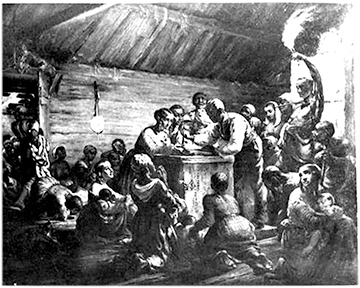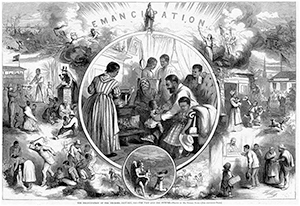THE ORIGINS OF WATCH NIGHT
- Details
- Category: Spiritual Community
- Published on Monday, 06 January 2020 23:56
- Written by D.V. LAWRENCE
Some folks come to church first, before going out to celebrate. For others, church is the only New Year's Eve event. Many assume that Watch Night is a fairly standard Christian religious service -- made a bit more Afro-centric because that's what happens when elements of Christianity become linked with the Black Church.
Yet, although the Watch Night services celebrated today in Black communities can be traced back to gatherings on December 31,1862, also known as "Freedom's Eve." the origins of Watch Night actually began with the Moravians, a small Christian denomination whose roots lie in what is the present-day Czech Republic. The first such service is believed to have been held in 1733 on the estates of Count Nicholas von Zinzendorf in Hernhut, Germany.
John Wesley, founder of the Methodist movement, picked it up from the Moravians, incorporating a Watch Night vigil into the practices of his denomination beginning in 1740. Methodist Watch Nights were held once a month and on full moons, with the first such service in the United States reportedly taking place in 1770 at Old St. George’s Church in Philadelphia. These services survive to the present day in that denomination’s worship manuals as “Covenant Renewal Services.”
What was being “watched over” in those earlier services was one’s covenant with God. Those gatherings were a time for congregants to meditate on their state of grace: were they spiritually ready to meet their maker if the call were suddenly to come? As the 13th chapter of Mark instructs, the faithful need to be ever vigilant, because the hour of the Lord’s coming is not known. (Watch ye therefore: for ye know not when the master of the house cometh.)
Black congregations, especially those in the South, already had a tradition of gathering on New Year’s Eve prior to the Emancipation Proclamation.
They often met on New Year’s Eve because New Year’s Day for many black people in the slave-era South was known as “Heartbreak Day,” according to Valdosta State University history professor Dr. David Williams in his book, “A People’s History of the Civil War.”
New Year’s Day was often the day when slaveholders sold slaves, when families, parents and children, husbands and wives, were separated.
 Slaves gathered on New Year’s Eve because that may be the last time many families had the opportunity to be together.
Slaves gathered on New Year’s Eve because that may be the last time many families had the opportunity to be together.The end-of-year Watch Night of 1862 took on special significance attaching to the impending 1 January 1863 enactment of the Emancipation Proclamation, and that night has come to be known as “Freedom’s Eve.” On 22 September 1862, President Lincoln issued his Preliminary Emancipation Proclamation, which stated: “On the first day of January … all persons held as slaves within any State, or designated part of a State, the people whereof shall then be in rebellion against the United States shall be then, thenceforward, and forever free.” Lincoln subsequently issued the Emancipation Proclamation itself on 1 January 1863.
 On that night, African Americans came together in churches and private homes all across the nation, anxiously awaiting news that the Emancipation Proclamation actually had become law.
On that night, African Americans came together in churches and private homes all across the nation, anxiously awaiting news that the Emancipation Proclamation actually had become law.Then, at the stroke of midnight, it was January 1, 1863, and all slaves in the Confederate States were declared legally free.
When the news was received, there were prayers, shouts and songs of joy as people fell to their knees and thanked God. Black folks have gathered in churches annually on New Year's Eve ever since, praising God for bringing us safely through another year.
It's been 145 years since that first Freedom's Eve and many of us were never taught the African American history of Watch Night, but tradition still brings us together at this time every year to celebrate "how we got over."
